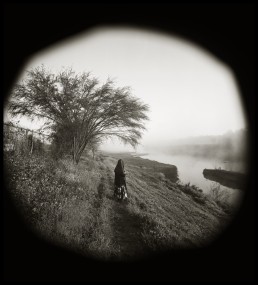S3: Fine Line - Episode 1 - Thelma

Episode Information
Fine Line: Mental Health/Mental Illness – Episode 1 – Thelma
[Intro Music]
Narrator: Welcome to Season three Fine Line narrative histories about mental health and mental illness, a traveling exhibition and weekly podcast edited and hosted by Michael Nye, supported by Kronkosky Charitable Foundation. May you find insight and understanding in these voices. Episode one, Thelma.
Thelma: Life is totally unpredictable. Most of the time you can’t prepare yourself for the good things or the bad things. I think it’s a fair balance of each, each makes you appreciate the other. You gotta have some light and dark. The thing I remember would be the days in, in New Mexico and there was a big cottonwood tree and the leaves. They made a sound, they shimmered in the sunlight. And I’m still absolutely blown over by a cottonwood tree. I I stop at the middle of the freeway if there was one. And, uh, when you’re a child, everything is, you hear, you taste, you see differently.
When I was about 10 years old, my mother chartered a plane to fly to New Mexico. She was at the height of her mental illness, but I didn’t know it. And as we got over Marfa or Alpine, she got into a fight with the pilot because she was trying to commit suicide and knows the plane into the ground. And I don’t know how long the fight lasted, but he somehow got the control away from her. But it was awful. And then the, when we did land, somebody sort of took care of me and they took her away. I remember it was written up in the paper. I found a clipping years later and I, oh, I was so embarrassed.
My mother was proven unfit. I was given custody to my father in the daytime. I went to a convent and then at night, if he was in town or whatever, then I was subjected to the horrors of incest only to go back the next day to the convent and listen to modesty and chastity. And the conflict is, is terrible for a child. They see the opposite of love isn’t hate, it’s indifference. Uh, I was sent to live with my grandparents who only spoke Spanish. I felt so supremely safe and locked in the regimen of their daily life, which was so, so simple and almost primitive. And I learned to sing the little song over and over because it was lilting and, and happy. (Singing song in Spanish) And that’s all I remember. It in the last line says, perhaps the little children are angels of God.
Depression is very hard to describe. It’s not so much a thing, is a lack of, it’s like a dark cave, devoid of feeling, devoid of light, nothing to look forward to. It’s a horrible state of non-existence. My type of mental illness now is bipolar. They used to say manic depressive. Part of my mental troubles had me prowling around the missions at two or three in the morning. And the little candles were flickering and and walls, a lot of them had crumbled. I had been walking around wearing some strange garment and get this, would you believe crown of thorns from a ski tree up there. And someone reported a creature walking around. And I remember being very roughly handled and, uh, taken a, in a patrol car to the hospital. I was aware that it was a pad wagon. That part of me was embarrassed. But what can I do about it? If there ever was a good time to be mentally ill, it’s now, if you’re gonna be sick, do it now and avoid the rush. They have medications, they have therapy, they have counseling. There is a plethora of things out there to, to help you.
Oh, I’m a cemetery freak because it’s quiet. No boom boxes, and it’s green and it’s peaceful. And you can just think or not think, just absorb everything. There are always the trees with changing seasons. I feel like life is a great deal like fog. It’s hard to be wise. You know, when, when you really need to, you can see a sore, a break, a, a cut, but you don’t see mental illness. You only react to it. You see what they do and it’s bizarre and ridiculous and, and at times funny. I would just say, hold on. Just hold on. It’ll get better.
[Outro Music]
Host: This is the first episode in season three; Fine Line Mental Health and Mental Illness, stories about understanding. I photographed Thelma along the San Antonio River on a cold November morning. The fog was just lifting. We walked past Cyprus, Sycamore, and Cottonwood trees. We talked and talked for three days in Thelma’s cozy blue cottage. Her voice is comforting. The first line of a poem, “Palm reading”. Barbara Ras writes, give me your whole hand. So it opens the way dreams bloom at night. Thelma’s voice blooms and glows. She takes us on a journey through the depths of depression and psychosis to the other side of hope and understanding Thelma is open and honest and direct. She invites us to listen. May something in her story stay with you. I’m Michael Nye. You may go to my website, michaelnye.org/podcast for photographs and transcripts. Thank you for listening.
